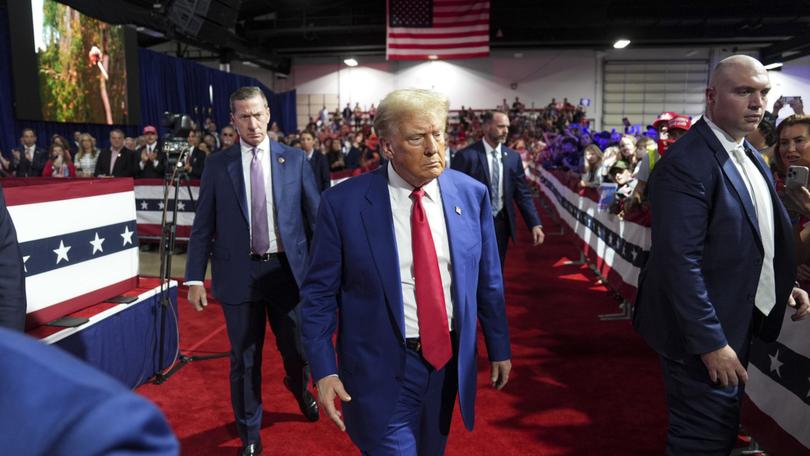Donald Trump criticised for comparing Jan. 6 defendants to WWII Japanese internment
The claim drew swift condemnation from the Japanese American Citizens League.

Republican presidential nominee Donald Trump compared the detention of his supporters who have been charged or convicted in the Jan. 6, 2021, attack on the U.S. Capitol to the mass imprisonment of people of Japanese descent without charges during World War II.
The remark, in an interview with pro-Trump radio host Dan Bongino that aired on Friday, was the latest escalation in Trump’s defence and glorification of charged and convicted rioters, including some who attacked police officers. Trump has repeatedly pledged to pardon the defendants and called for their immediate release.
Federal prosecutors have charged more than 1500 people in the Capitol breach, including 1200 who pleaded guilty or were convicted at trial. Nearly 600 were charged with assaulting police or rioting, while the majority were misdemeanours such as trespassing or disorderly conduct on restricted Capitol grounds. At least five people died during or immediately after the violence, which injured 140 officers and delayed Congress’s certification of the 2020 election results.
Sign up to The Nightly's newsletters.
Get the first look at the digital newspaper, curated daily stories and breaking headlines delivered to your inbox.
By continuing you agree to our Terms and Privacy Policy.“Nobody’s ever been treated like this,” Trump said in Friday’s interview. “Nobody’s ever — maybe the Japanese during the Second World War, frankly. But you know, they were held too.”
In 1942, following Japan’s surprise attack on Pearl Harbor and the United States’ entry into World War II, the federal government forcibly evacuated and detained about 112,000 Japanese Americans on the West Coast, including 70,000 U.S. citizens. None of the detainees were individually charged or held on any individual suspicion, and they had no opportunity to contest their denial of liberty, according to the National Archives.
In 1988, Congress officially apologised for the injustice of imprisonment and paid $20,000 to each incarcerated person.
“It’s flat-out offensive. It’s a night-and-day difference what happened,” David Inoue, executive director of the Japanese American Citizens League, said of Trump’s comparison. “Japanese Americans’ whole families were incarcerated without any sort of trial — their own crime was they were of Japanese descent. For these January 6 people, they have had their day in court, they’ve either been indicted or convicted of crimes, and that is why they’re being incarcerated.”
Inoue also raised concern about Trump’s proposal last week in Aurora, Colo., of a mass deportation operation citing the Alien Enemies Act of 1798, the same law that was used to justify Japanese incarceration.
The U.S. Supreme Court sustained incarceration camps in a 1944 decision called Korematsu v. United States that established broad deference to the president’s war powers. The Supreme Court’s Republican appointees technically overturned the Korematusu ruling in their 2018 decision that upheld Trump’s ban on travel from Muslim-majority countries, over the objection of Democratic-appointed justices who said both decisions used the same underlying logic.
In Friday’s interview, Trump questioned the ongoing imprisonment of some Jan. 6 defendants based on a Supreme Court decision earlier this year that said prosecutors misapplied an obstruction charge in some cases. The decision did not automatically free anyone but affected the cases of 259 people charged with or convicted of that crime. No one was charged with that crime alone, according to the Justice Department.
As of Oct. 6, one defendant received a reduced sentence because of the decision, and prosecutors said they do not oppose dropping the charge in about 49 affected cases that were already adjudicated. For 126 affected cases that are still pending, prosecutors said they dropped the charge for 73 defendants and are still pursuing it for 13 while reviewing others.
Trump also repeated a false claim about weapons at the riot. Six people were arrested on Jan. 6 while having guns in the vicinity of the Capitol, and a seventh the next day. Police officers testified to observing more weapons that they did not confiscate because of their focus on defending the Capitol. More than a dozen people have been charged with bringing weapons to D.C., and others acknowledged stashing them at hotels or other locations. Some who brought guns were not charged with firearms offences.
“Nobody was killed and there were no guns involved,” Trump said in the interview.
Trump repeated the same falsehood on Wednesday during a Univision town hall. In those remarks, he used the first person plural to group himself with the rioters.
“We didn’t have guns,” Trump said. “The others had guns, but we didn’t have guns.”
- - -
Spencer S. Hsu contributed to this report.
© 2024 , The Washington Post
